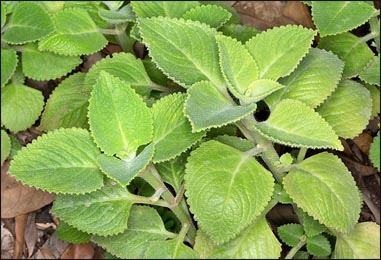What are the Uses and Health Benefits of Indian Borage (Plectranthus amboinicus)?

Introduction
The art of utilizing herbs for different purposes is well documented in Ayurveda. The medical properties of plants are based on the presence of certain phytochemicals in them. Among the several medicinal plants used in Ayurveda, Plectranthus amboinicus is known to possess anti-microbial, anti-oxidant and anti-epileptic properties. It is also considered as a diuretic herbal agent and its leaves have a pungent taste and a pleasant odour. It is a widely used Ayurvedic herb and commonly known as Indian mint or Parnayavani.
Categorization
- Kingdom: Plantae
- Family: Lamiaceae
- Common Name: Country Borage, Indian Borage, Indian Mint
- Hindi Name: Patta ajwayin
- Botanical Name: Plectranthus amboinicus
- Synonyms: Karpooravalli, Parnika, Sugandha, Ashmari Bheda, Himsagar, Chornika.
Morphology
Indian Borage is a small growing plant which can grow up to a height of 1-2 feet. Its stem has little strength and fleshy in nature. The leaves have strong odor and are little oval, thick and fleshy in nature having hair like structure. Its flowers are small and purple colored and cultivated in temperate climate in India.
Medicinal Properties of Plectranthus amboinicus
- Taste (Rasa): Pungent (Katu) and Bitter (Tikt)
- Qualities: Light to digest (laghu), dry (ruksha) and strong (tikshana)
- Vipaka: Katu which means it undergoes pungent taste conversion after digestion.
- Potency: Hot (Ushna)
- Effect on Tridosha: Balances Kapha and Vata dosha.
Part Used: Leaves
Dosage: Internal dosage of 5-10 ml in juice form is recommended.
Chemical Constituents of Plectoranthus amboinicus
The leaves of Plectoranthus amboinicus contain carvacrol and camphor as the major constituents. Other constituents of leaves are flavonoid, oxaloacetic acid, beta-sitosterol, cirsimaritin etc. Other parts of the plant contain an essential oil known as thymol.
Health Benefits of Plectoranthus amboinicus
Respiratory Problems
This herb is very useful in the treatment of sore throat, congestion, sinusitis etc. as it contains the compounds that act as powerful expectorant which eliminate phlegm and mucus from the respiratory tracts.
- Being anti-microbial in nature, it prevents bacteria and other pathogens from lodging and developing in the tracts.
- It also helps to boost the immune system.
Arthritis
The leaves of Plectoranthus amboinicus contain the volatile compounds that are rich in Omega-6 fatty acids such as gamma-linolenic acid.
- Gamma-linolenic acid is known to reduce arthritis by preventing joint degeneration.
- This herb is useful for the patients who are suffering from osteoporosis or athletes who have regular stress impact on their bones and joints.
Increases Immunity
It contains high amounts of Vitamin C that make this herb an immune booster.
Vitamin A and carotenoids present in it improve the vision, reduce oxidative stress and prevent macular degeneration.
Improves Kidney Health
Being diuretic in nature, this herb is efficient in cleaning the body toxins and stimulates urination.
- It also expels the amount of excess fat, salt and water from the body.
- Therefore, it keeps the functioning of kidneys and lymphatic system proper.
Skin Care
Indian borage is most effective for skin as it possesses anti-inflammatory compounds.
Therefore, it can quickly reduces the swelling, redness and eliminates irritation and itchiness.
Irritable Bowel Syndrome
In ancient times, this herb was used for the treatment of stomach upset.
It is a useful herb for the treatment of Irritable Bowel Syndrome as it soothes the inflammation of the stomach and improves digestion.
How Indian Borage can be Used at Home?
- For intestinal worms, 10 ml juice of fresh leaves of Indian borage should be given with hot water.
- For treating indigestion and improving appetite, fresh juice of the leaves is administered with ginger juice. It is quite useful in the disorders of digestive system and gastrointestinal complaints.
- The paste of the leaves of Indian borage can be applied on the head to relieve headache.
- In eye inflammation such as conjuctivitis, the juice of the leaves is applied on the orbit to relieve pain.
- For respiratory problems, the juice of leaves is mixed with sugar and given to children who are suffering from asthma, chronic cough etc. 5-6 ml juice of the crushed leaves is given with honey to treat rhinitis, cough etc.
- For diarrhea and irritable Bowel Syndrome (IBS), the juice is given with the decoction of Kutaja (Holarrhena antidysentrica).
- For insect bites, crush the leaves of this plant, mix them with coconut oil and apply on the affected part.
- In fever, consume two tablespoons of the juice of Indian borage leaves twice a day.
Adverse Effects
There are no adverse effects known but some people feel burning sensation in the tongue after the intake of its juice.
It is best to use herbs under medical supervision.



